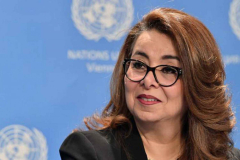UNODC helps find new income for poppy farmers, tackle high-level cyber crime, writes Poramet Tangsathaporn
Cross-border and multisectoral cooperation among countries in the greater Mekong subregion (GMS) is needed to mitigate illicit drugs, says the United Nations Office on Drugs and Crime (UNODC).
During a recent online interview with the Bangkok Post, UNODC executive director Ghada Fathi Waly said tackling illicit drug farming is not just about removing illicit crops, but finding a way to help growers turn to legitimate sources of income.
“The farmers who cultivate crops like opium poppies are trying to meet basic needs for their families. We need to generate sustainable livelihoods at scale for farmers, provide business training and access to markets, empower women in rural communities, and educate young people while being responsible towards the environment,” she said.
“That requires a far bigger level of investment from the international community than what we have at the moment.”
Ms Waly was in Chiang Mai early this month as a speaker at the “From Alternative Development to Sustainable Development Goals: Empowering Alternative Development to Address Global Challenges” international conference organised by the Royal Project Foundation.
She said Thailand is a global leader in finding alternative and sustainable ways for these farmers that help them convert from growing opium poppies to cold climate, high-land crops through the Royal Project Foundation, which help them gain sustainable income.
Ghada Fathi Waly. United Nations Office on Drugs and Crime (UNODC)
A key partner
Thailand has long been a key partner for the UNODC in Laos and Myanmar. With this effort, Thailand could help push opium out of the Golden Triangle, the border area of Thailand, Laos and Myanmar, and in other countries in the GMS region, she said.
Asked what Thailand could do regarding the drug situation in the region, she said synthetic drugs such as methamphetamine and ketamine have fundamentally transformed the regional drug market.
Methamphetamine production has risen swiftly, and an alarming amount of synthetic drugs were seized last year.
Read More





